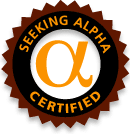Normally, when markets get really wild, as they have been lately, investors pour into to safe haven assets. These assets are generally highly liquid, and relatively provide extremely low returns. When market uncertainty increases, and investors become risk averse, the crowd will flood into investments like bonds, money market funds, treasuries, and the dollar.
Many investors get to the point of taking their money out of the markets when volatility and uncertainty picks up. When this happens it creates a huge demand for the US Dollar, and consequentially the US Dollar benefits and begins to strengthen.
Although there is nothing wrong with getting out of the equity markets and into safe haven assets, such as the dollar, there is a key factor at the moment that may make that play a bit more risky.
This factor is the recent market sentiment for the US Dollar. I spoke of sentiment on the dollar last December, and recommend a GBP/USD short and EUR/CHF short, which performed very well with each pair dropping substantially. However, that same sentiment may be changing to be a negative thing for the US Dollar in the medium term.
If you are in need of a safe haven in these turbulent times (volatility surged several days ago) then you may want to consider rushing into a different currency than the US Dollar. Why? because sentiment is changing....
Current dollar *sentiment against the British Pound and Swiss Franc:
GBPUSD - The ratio of long to short positions in the GBPUSD stands at -1.17 as nearly 54% of traders are short. Yesterday, the ratio was at 1.27 as 56% of open positions were long. In detail, long positions are 6.6% lower than yesterday and 32.1% weaker since last week. Short positions are 38.8% higher than yesterday and 1.9% stronger since last week. Open interest is 13.3% stronger than yesterday and 12.8% below its monthly average. The SSI is a contrarian indicator and signals more GBPUSD gains.
USDCHF - The ratio of long to short positions in the USDCHF stands at -1.06 as nearly 51% of traders are short. Yesterday, the ratio was at -1.24 as 55% of open positions were short. In detail, long positions are 7.0% higher than yesterday and 7.9% stronger since last week. Short positions are 9.0% lower than yesterday and 53.1% weaker since last week. Open interest is 1.9% weaker than yesterday and 26.8% below its monthly average. The SSI is a contrarian indicator and signals more USDCHF gains.
What does this suggest?
It suggests that the dollar strength sentiment I spoke of several months ago in December is now running out of steam, and sentiment is now turning in favor of dollar weakness against these pairs for the short to medium term. Therefore, as a safe haven investment US Dollar cash investments are not looking so good based on currency market sentiment. If anything, you may want to consider rushing into the GBP or Swiss Franc to ride out these rough and indecisive times.
*FXCM sentiment data
Wednesday, May 12, 2010
Saturday, May 1, 2010
Sound Investing for Retirement
Retirement may be a long way off for you – or it might be right around the corner. No matter how near or far it is, you’ve absolutely got to start saving for it now. However, saving for retirement isn’t what it used to be with the increase in cost of living and the instability of social security. You have to invest for your retirement, as opposed to saving for it!
Let’s start by taking a look at the retirement plan offered by your company. Once upon a time, these plans were quite sound. However, after the Enron upset and all that followed, people aren’t as secure in their company retirement plans anymore. If you choose not to invest in your company’s retirement plan, you do have other options.
First, you can invest in stocks, bonds, mutual funds, certificates of deposit, and money market accounts. You do not have to state to anybody that the returns on these investments are to be used for retirement. Just simply let your money grow overtime, and when certain investments reach their maturity, reinvest them and continue to let your money grow.
You can also open an Individual Retirement Account (IRA). IRA’s are quite popular because the money is not taxed until you withdraw the funds. You may also be able to deduct your IRA contributions from the taxes that you owe. An IRA can be opened at most banks. A ROTH IRA is a newer type of retirement account. With a Roth, you pay taxes on the money that you are investing in your account, but when you cash out, no federal taxes are owed. Roth IRA’s can also be opened at a financial institution.
Another popular type of retirement account is the 401(k). 401(k’s) are typically offered through employers, but you may be able to open a 401(k) on your own. You should speak with a financial planner or accountant to help you with this. The Keogh plan is another type of IRA that is suitable for self employed people. Self-employed small business owners may also be interested in Simplified Employee Pension Plans (SEP). This is another type of Keogh plan that people typically find easier to administer than a regular Keogh plan.
Whichever retirement investment you choose, just make sure you choose one! Again, do not depend on social security, company retirement plans, or even an inheritance that may or may not come through! Take care of your financial future by investing in it today.
Let’s start by taking a look at the retirement plan offered by your company. Once upon a time, these plans were quite sound. However, after the Enron upset and all that followed, people aren’t as secure in their company retirement plans anymore. If you choose not to invest in your company’s retirement plan, you do have other options.
First, you can invest in stocks, bonds, mutual funds, certificates of deposit, and money market accounts. You do not have to state to anybody that the returns on these investments are to be used for retirement. Just simply let your money grow overtime, and when certain investments reach their maturity, reinvest them and continue to let your money grow.
You can also open an Individual Retirement Account (IRA). IRA’s are quite popular because the money is not taxed until you withdraw the funds. You may also be able to deduct your IRA contributions from the taxes that you owe. An IRA can be opened at most banks. A ROTH IRA is a newer type of retirement account. With a Roth, you pay taxes on the money that you are investing in your account, but when you cash out, no federal taxes are owed. Roth IRA’s can also be opened at a financial institution.
Another popular type of retirement account is the 401(k). 401(k’s) are typically offered through employers, but you may be able to open a 401(k) on your own. You should speak with a financial planner or accountant to help you with this. The Keogh plan is another type of IRA that is suitable for self employed people. Self-employed small business owners may also be interested in Simplified Employee Pension Plans (SEP). This is another type of Keogh plan that people typically find easier to administer than a regular Keogh plan.
Whichever retirement investment you choose, just make sure you choose one! Again, do not depend on social security, company retirement plans, or even an inheritance that may or may not come through! Take care of your financial future by investing in it today.
Subscribe to:
Posts (Atom)





